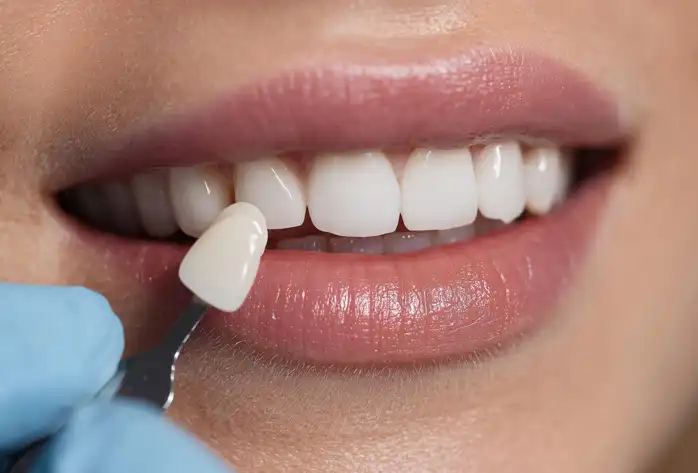Porcelain and Composite Veneers
We offer Porcelain and Composite Veneers. Dental veneers are thin natural looking shells that your dentist will get custom-made to improve the shape, colour, or overall appearance of your tooth or teeth.
Custom-made
Porcelain and composite veneers
The two most common forms of dental veneers are porcelain and composite veneers. Porcelain veneers are thin shells of porcelain that are fixed to the outer-surface of the tooth. Moreover, composite veneers are artificial resin which dentist fix to the outer-surface.

Use of dental veneers
It is one of the dental procedures in the field of cosmetic dentistry, dental veneers help in making a smile more perfect. Apart from shaping the teeth but also cover any stains or discolouration. Moreover, you can customise dental veneers to suit each individual. The lab creates them from porcelain or resin composite which are restorative materials.
Besides, we might recommend the use of dental veneers to correct spaces between teeth; to cover cracks, chips, or teeth that are in poor shape; or to cover stains in fillings or teeth. Thus, while dental veneers rate well on the aesthetic front, they don’t help in correcting cases of overbites or underbites. Therefore, choosing between porcelain and composite veneers essentially depends on strength and longevity.
Porcelain veneers
- Longer lifespan
- Lack of porosity after glazing ensures no staining
- More expensive
- Follow a more complex process
- Mimic your natural tooth colour as closely as possible
Composite veneers
- Porosity can lead to staining
- Require lesser tooth reduction in most cases
- Placement can be more conservative
- Require extensive polishing for natural finish
- Typically made using engineered resin
- Less expensive
The Process
The typical process of placing a veneer takes two appointments. The dentist takes an impression of the tooth for the fabrication. The dentist will place the temporary veneer on the tooth with spot etching. Once the laboratory delivers the veneer, the dentist removes the temporary veneer. Dentist then cleans the permanent veneer with pumice and water. After etching and air drying, the dentist places the veneer for exact fit and contour. The dentist uses a light to cure it. Finally, the dentist will remove any excess material and polish the margins of the veneer.
Care for Veneers
You can brush and floss just as you would your regular teeth. Use of non-abrasive fluoride toothpaste. Reduce intake of stain-inducing foods. Also, proper oral hygiene will help them last longer.
Composite Veneers FAQ's
What is a dental veneer?
The use of dental veneers is a popular cosmetic dentistry technique that helps shape teeth properly and improve a smile. The porcelain or resin composite veneers are handcrafted to suit each individual’s dental needs. Essentially, dental veneers are tooth-like shells made of composite materials that resemble tooth enamel. Also, disguising discoloration of the teeth, veneers can also hide uneven dental surfaces as well as chips and cracks.
Are there different types of veneers?
The two types of veneers that dentists use are dental porcelain veneers and composite resin veneers. Porcelain veneers are a versatile cosmetic dental work that resembles natural teeth and can be used to improve, protect, and display the aesthetics of teeth. In addition to repairing discoloration, chips, and cracks in teeth, veneers made with resin composites are also cost-effective. Besides, porcelain veneers make teeth look brighter, prevent wear and tear, and restore severe oral health conditions like fractures, spaces, chips, and uneven texture.
What are the benefits of dental veneers?
Besides durability, dental veneers offer many benefits, such as camouflaging discoloration in the teeth. In addition to offering a white and a brilliant smile, dental veneers made with a versatile material can cover teeth that have flaws.
How natural do dental veneers look?
Definitely looks natural! Due to the fact that dental veneers are made of durable ceramic materials, dental veneers look very natural and their colour is similar to that of the natural teeth. In addition to improving a patient’s self-confidence, dental veneers provide an attractive smile as they are made to closely match and mirror the color of the patient’s teeth.
Are dental veneers helpful in treating dental problems?
Yes, because dental veneers offer a versatile solution to many dental problems, including gaps between teeth, overlapping teeth, teeth with flaws, wear & tear out from grinding, or dull from too much coffee, tea, smoking, medication, soft drinks or even wrong diet.
How well do dental veneers fit?
Dentists fit dental veneers with dental cement that is durable and long lasting and also give each patient a comfortable fit for their teeth.
How long do dental veneers last?
In addition to being long lasting and durable, dental veneers maintain their strength and colour for a lifetime.
When do people need dental veneers?
Veneers could help cover teeth with misalignment or uneven surfaces, or teeth which have gaps that are obvious, and they can be used in a minimally invasive manner.
Do composite veneers ruin your teeth?
The answer is no, they don’t. Veneers will not harm your teeth in any way. In fact, composite veneers will enhance their natural beauty. Moreover, they will not damage your natural teeth and they will match your smile.
Composite veneers are safe since the resin material used to make them is inert and won’t harm you. In addition, they are less invasive than porcelain because they do not require drilling because the resin is sculpted onto your teeth by your dentist.
How comfortable are porcelain veneers?
In addition to covering the tooth, dental veneers are custom-made to each individual’s unique teeth and therefore offer comfort. In the event that the patient is uncomfortable while fitting, the cosmetic dentist will numb the area with local anesthesia.
How many visits do you need for composite veneers?
A dental veneer procedure may require three or more visits to the dentist’s clinic, with the procedure beginning with an examination of the teeth. Diagnostic and treatment planning would also involve X-rays. In the second visit, the dentist will remove about 1/2 millimeter of enamel from the tooth’s surface after anesthetizing the area. An exact model of the tooth or teeth will be made, which will be sent to a dental lab for fabrication. Patients can request a temporary veneer at an additional cost. A dentist will place the dental veneer and adhere it with durable cement on the third visit, and check its fit and size. In order to speed up the placement of dental veneers, a light beam will be used to harden the cement. The dentist may recommend a follow-up visit to recheck the permanent dental veneer or veneers.
How much do composite resin veneers cost?
This depends on lot of factors. It is best to consult our dentist and get a treatment plan and cost.
You might be also interested in

Family Dentist in Browns Plains
This family dentist in Browns Plains also provides a full range of dental services including root canal treatment, fillings, extraction of teeth, cleaning and polishing, dental implants, dentures, veneers, crowns and bridges, tooth whitening, custom fitted mouth guards, as well as preventive dentistry for children.
Call us to schedule your comprehensive dental exam now at 07 3800 4140.

Family Dentist in Browns Plains
This family dentist in Browns Plains also provides a full range of dental services including root canal treatment, fillings, extraction of teeth, cleaning and polishing, dental implants, dentures, veneers, crowns and bridges, tooth whitening, custom fitted mouth guards, as well as preventive dentistry for children.
Call us to schedule your comprehensive dental exam now at +61 434 921 570.